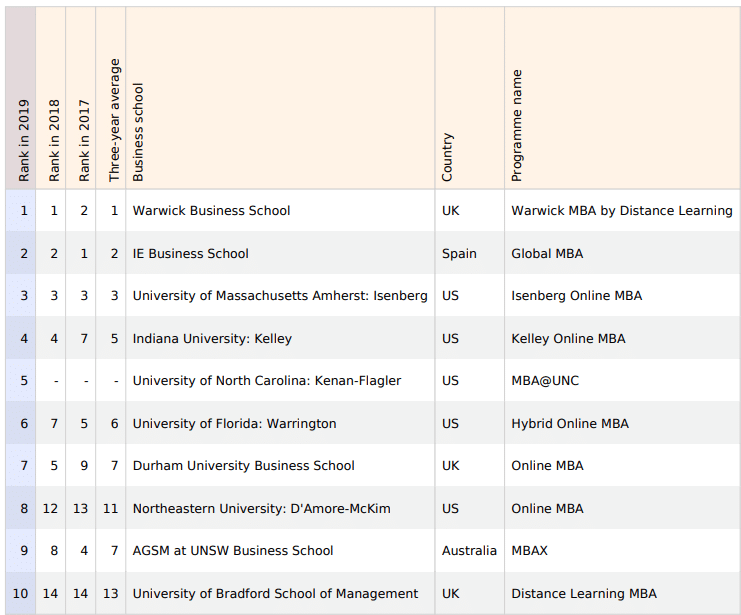
AGSM @ UNSW Business School’s recent position in the Financial Times’ Online MBA Rankings 2019 brought to light the relevance of business school and MBA rankings, and their growing significance in the academic community.
From the Financial Times’ Global MBA Rankings to the Economist’s Which MBA? report, it is big news for any business school when a third party compares its MBA with some of the best programs in the world.
When the Financial Times’ recognised AGSM’s AGSM MBAX as one of the world’s top 10 best online MBAs, it did so along with other programs including Warwick Business School’s Warwick MBA by Distance Learning in the UK and IE Business School’s Global MBA in Spain.

UNSW Business School Deputy Dean and AGSM Director Professor Nick Wailes said, “we are the only school outside of the US and Europe to feature in these rankings – a testament to the veracity of our program and the high-calibre candidates we attract.”
These types of global rankings occur every year, so it is important to break them down and find out what they mean for Australia’s MBA programs.
What are MBA rankings used for, and why are they important?
CS CEO Nunzio Quacquarelli perhaps said it best when he described MBA rankings as unique opportunities for both applicants and schools to compare and contrast programs.
“Usually, the data serves as a starting point for analysing the culture and campus life you’ll find at various business programs. You can see which schools specialise in thought leadership, which in entrepreneurship, and so on,” he said.
Rankings can serve as an indicator for future students as to whether or not an MBA program or business school is right for them. Students looking to study an MBA are more likely to consider business schools which rank highly for their ability to help graduates increase their salaries and advance their careers. Students also consider how a business school ranks in faculty support, education delivery and overall cohort satisfaction.
A good ranking can also affect students after they have graduated, according to Personal MBA Coach Founder Scott Edinburgh who said in a BusinessBecause article, “right or wrong, many [employers] will use the quality of your education as a signal of your potential value and these rankings most often shape the perceived quality of your education.”
Rankings also serve business schools as differentiators and accountability boosters. Being ranked highly and regarded amongst the best schools in the world can be extremely beneficial. For example, Melbourne Business School can promote the fact it scored as the top Australian school in the FT 2018 Americas and Asia-Pacific top 25 business school rankings. Even on the domestic stage, rankings can motivate educators to be the very best they can be.
How are schools and MBA programs ranked?
There are several ways a business school’s MBA is ranked. The methods vary between those responsible for scoring, but typically rankings are determined by a list of criteria and specific elements which are important to students and the business industry.
For example, the 2019 Financial Times’ Global MBA Rankings were determined through data was collected through two online surveys — the first was completed by participating schools and the second by their alumni who graduated in 2015. The surveys gathered information on a student’s salary increase compared with pay on graduation and their career progression, gender balance and the extent to which it was delivered online. Schools were also graded on their value for money, which was calculated by dividing average alumni salary three years after graduation by an MBA’s total cost, including tuition fees and other expenses.
Similarly, The Economist’s Full-time MBA ranking in 2018 was measured by collating survey data from MBA students and business schools, covering graduate salaries, students’ average GMAT scores, a school’s number of registered alumni, and the quality of the faculty, facilities and career services department.

Some things to consider
While rankings can benefit prospective students and business schools alike, many agree that it is an imperfect system. In 2018, The Economist noted in its ranking methodology:
“Results of rankings can be volatile, so they should be treated with caution. The various media rankings of MBA programmes all employ a different methodology. None is definitive, so our advice to prospective students is to understand the ethos behind each one before deciding whether what it is measuring is important for you.”
https://www.economist.com/whichmba/full-time-mba-ranking-methodology-2018
Some rankings are general and some are based purely on the subjective experience of the research subjects. Some rankings have even been called into question because of what they do and do not include in their criteria.
Despite a few shortcomings, many MBA rankings are evolving and modernising to reflect the current business climate. The Financial Times’ rankings, for example, were called out recently for focussing too much on salaries and not enough on environment and social responsibility. However, FT’s Online MBA Rankings 2019 recently incorporated corporate social responsibility into its online rankings this year.

While MBA rankings are not a perfect system, they provide a valuable insight into how business schools and MBA programs stack up to the needs of students and the business world on a domestic and global scale.









